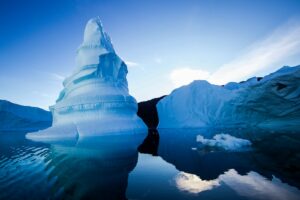Scientists have said major sea-level rises, due to the Greenland ice cap melting, is now inevitable, with the world looking at a minimum rise of 27cm.
Research has shown that global heating will cause around 110tn tonnes of ice in Greenland to melt, causing at least a 27cm sea-level rise, even if the burning of fossil fuels was stopped today.
The data is based on two decades worth of measurements taken by glaciologists at the National Geological Survey of Denmark and Greenland (GEUS) who wanted to determine the absolute minimum impact the climate crisis will cause as it stands.
If society carries on as it is and the climate crisis is exacerbated then seas could rise even further and reach a 78cm rise if the ice cap continues to melt at its current rate.
‘It is a very conservative rock-bottom minimum,’ said Prof Jason Box from the National Geological Survey of Denmark and Greenland (Geus), who led the research. ‘Realistically, we will see this figure more than double within this century.
‘In the foreseeable scenario that global warming will only continue, the contribution of the Greenland Ice Sheet to sea level rise will only continue increasing. When we take the extreme melt year 2012 and take it as a hypothetical average constant climate later this century, the committed mass loss from the Greenland Ice Sheet more than doubles to 78cm.’
The study does not account for melting elsewhere, such as in Antarctica or other glaciers across the world, meaning the situation could be even worse than this research suggests.
Additionally, research by Caltech and NASA’s Jet Propulsion Laboratory has found ice shelves in Antarctica are melting at an accelerated rate, leading to a rapid sea level rise.
The devastating effects of the climate crisis are already being felt in Pakistan which is experiencing unprecedented flooding due to monsoon rains and the melting of some of its 7,000 glaciers.
Photo by Anders Jildén
















